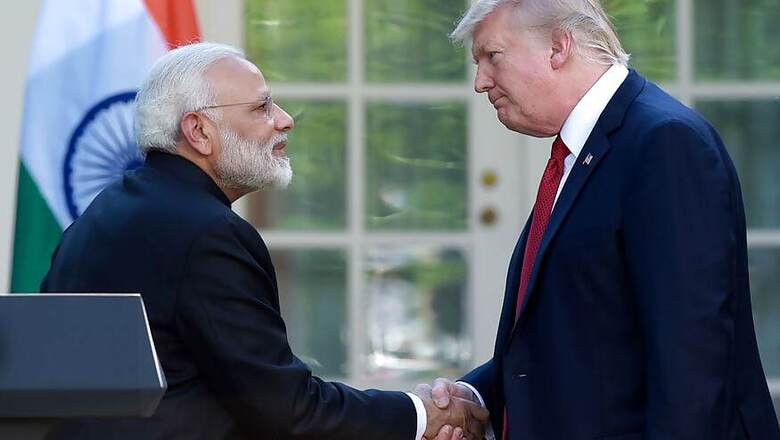
views
Islamabad: Pakistan has criticised the Indo-US joint statement asking it to rein in cross-border terrorism as a “singularly unhelpful” document that would further “embolden” India to even contemplate “military adventurism” and negate efforts to achieve durable peace in South Asia.
The meeting between President Donald Trump and Prime Minister Narendra Modi in Washington was a "missed opportunity" to induce India to alter its policies "inimical to peace" in the region, Pakistan’s Foreign Ministry said here in a terse statement.
The joint statement is "singularly unhelpful in achieving the objective of strategic stability and durable peace in the South Asian region, it said.
"By failing to address key sources of tension and instability in the region, the statement aggravates an already tense situation," the statement issued last night said.
During Prime Minister Modis visit to Washington, India and the US vowed to strengthen cooperation against terror outfits like Jaish-e-Mohammad, Lashkar-e-Taiba and D-Company, while asking Pakistan to ensure that its soil is not used for terror strikes against other nations.
In a joint statement released after maiden talks between Modi and Trump on June 26, the two nations called on Islamabad to "expeditiously bring to justice the perpetrators of the 26/11 Mumbai, Pathankot, and other cross-border terrorist attacks perpetrated by Pakistan-based groups."
The statement said that Pakistan was also deeply concerned on the sale of advanced military technologies to India. Such sales "accentuate" military imbalances in the region and undermine strategic stability in South Asia, it said, referring to the Trump administrations plans to sell Guardian drones and a C-17 heavy-lift cargo plane to India.
“This further emboldens India to adopt aggressive military doctrines and even contemplate military adventurism.”
“Transfers of modern military hardware and technologies as well as repeated exceptions made for India have dis-incentivised India to engage in efforts to establish a strategic restraint regime and a durable security architecture in the region," the foreign office said.
“Pakistan firmly believes in the legitimacy of the Kashmir cause and supports the peaceful struggle of the Kashmiri people for their right to self-determination - a right promised to them by the international community through repeated UN Security Council resolutions,” it said.
"Any attempt to equate the peaceful indigenous Kashimiri struggle with terrorism, and to designate individuals supporting the right to self-determination as terrorists is unacceptable," the foreign office, apparently referring to the designation of Hizbul Mujahideen chief Syed Salahuddin as a "global terrorist".
Equally unacceptable is the "wilful disregard of the atrocities being committed by Indian security forces against innocent Kashimiri civilians". This undermines the ideals and principles of the UN Charter. It endangers peace and security in the region, it said.
Pakistan stands ready and committed to resolve all outstanding disputes, especially Jammu and Kashmir, with India through peaceful means and in accordance with UN Security Council resolutions that underscore the importance of addressing the aspirations of the people of Kashmir, the foreign office said, adding that this is a commitment that India also needs to make publicly.
Claiming that Pakistan has been the "primary victim of terrorism" in the region, the statement said the country has achieved significant success in eliminating terrorists and their networks from its soil "without discrimination".
"We are committed to bring the fight against terrorism to its logical conclusion by eliminating this scourge from our soil.
"Pakistan expects the international community to unequivocally stand with it in this fight against terrorism," the foreign office said.
"Regrettably, those who seek to appropriate a leadership role in the fight against terror are themselves responsible for much of the terror unleashed in recent years in Pakistan", it claimed.
"India has supported the Tehrek-Taliban as a proxy against Pakistan from across the border. India’s culpability in creating this further source of regional insecurity cannot be ignored," the foreign office added.




















Comments
0 comment